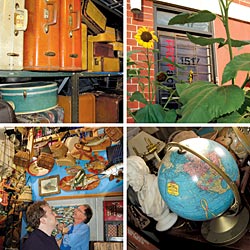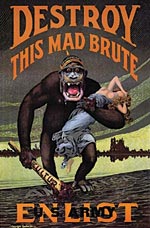Propping an Icon
 |
The Porchlight Music Theatre intrepidly sets sail on the sea of hope and sentiment, launching its new season with A Wonderful Life, the musical adaptation of It’s a Wonderful Life. That beloved movie tells the story of George Bailey, owner of a savings and loan in Bedford Falls who has given up his dreams so others can have theirs. Thinking his life a failure, he stands on a bridge, ready to jump, when his guardian angel shows him that he’s really led a wonderful life. Porchlight’s artistic director L. Walter Stearns (foreground) and scenic designer Kurt Sharp (right) grappled with how to make the 35-scene show fit into a restricted theatre space and still meet the visual expectations of audiences familiar with the film. Sharp knew, for instance, “that we needed strong, simple things for scenes to make both subtle and instant connections.” That meant a trip to Propabilities, Inc. (1517 N. Elston Ave.), a prop shop with acres of stuff sardined into one building. Stearns and Sharp bounced ideas off each other as they sidled through narrow aisles carved out of palisades of potential props. Filigreed gold bells strung with red lights for Christmas scenes; an eared loving cup awarded to George for winning a dance contest; velvet-roped stanchions for the Bailey Savings & Loan scenes; suitcases to suggest George’s preparations for a trip he’ll never take; a mirror ball to give the effect of snow on the ground or for the marble floor of the bank. Stearns says he chose the musical “because it’s a story worth telling-a parallel to A Christmas Carol with its themes of values and redemption.” And if the enthusiasm in rehearsals is anything to go by, Stearns says, “it’s going to be a great show!”
November 11th through December 31st at Theatre Building Chicago, 1225 W. Belmont. Tickets: 773-327-5252.
–Gale Kappe
The Arts On War
 |
From Homer’s Iliad to Picasso’s Guernica, the arts have always responded to war. Peter Kuntz, a managing director of the 17th annual Chicago Humanities Festival (November 4th to 12th), contends that’s natural. “War is not just policy and missiles and armies,” he says. “It’s human beings. The arts are a way to the emotions. They go directly to our core, our id.” Here are some festival samples of what Kuntz means.
1 Poetry Pulitzer Prize–winning poet Yusef Komunyakaa puts it another way: “The news is so matter-of-fact, but literature creates a dialogue in the listener’s heart and mind, a kind of echo in the psyche.” Komunyakaa directs Steppenwolf Theatre Company’s ensemble member Tracy Letts in a reading of his poem The Autobiography of My Alter-Ego, which draws on the poet’s experiences in Vietnam. (Nov. 5 at 11:30. Chicago Cultural Center, 77 E. Randolph.)
2 Visual Arts Kuntz acknowledges that this year’s festival theme, “Peace and War: Facing Human Conflict,” is provocative, but maintains that festival organizers eschew any single political stance. “The arts reawaken us to war’s horrors-but also to nobility and heroism.” Expect this duality when scholar David Lubin contemplates images created both for and against US involvement in World War I-like this recruitment poster designed by H. R. Hopps ca. 1916. (Nov 11 at 10. The Newberry Library, 60 W. Walton.)
3 Theatre In a triple bill, historian David Blight discusses The Civil War in American Memory. Actors perform scenes from Charles Smith’s play Denmark about a failed 1822 slave rebellion. And Smith joins Blight onstage for a post-show chat. It all takes place in the new Victory Gardens Theater at the Biograph. (Nov 11 at noon. 2433 N. Lincoln.)
4 Film Legendary editor Walter Murch (Apocalypse Now, Jarhead) joins the Chicago Reader’s Jonathan Rosenbaum and Facets Multi-media’s Milos Stehlik to parse the festival’s combat flicks. “Many are historical, but each is very topical given contemporary events,” says Stehlik. “A great film forces you to think-to think why, in the 21st century, we’re in the middle of wars that are medieval in character.” (Nov 4 at 12:30. Thorne Auditorium, Northwestern University, 375 E. Chicago.)
5 Music The New Budapest Orpheum Society plays a mélange of Jewish-influenced music-hall songs in German, Yiddish, and English. They range from folk to cabaret to love songs, and portray a growing unease among European Jews before the Holocaust. (Nov 11 at 4. Chicago Sinai Congregation, 15 W. Delaware.)
–Robert Buscemi


